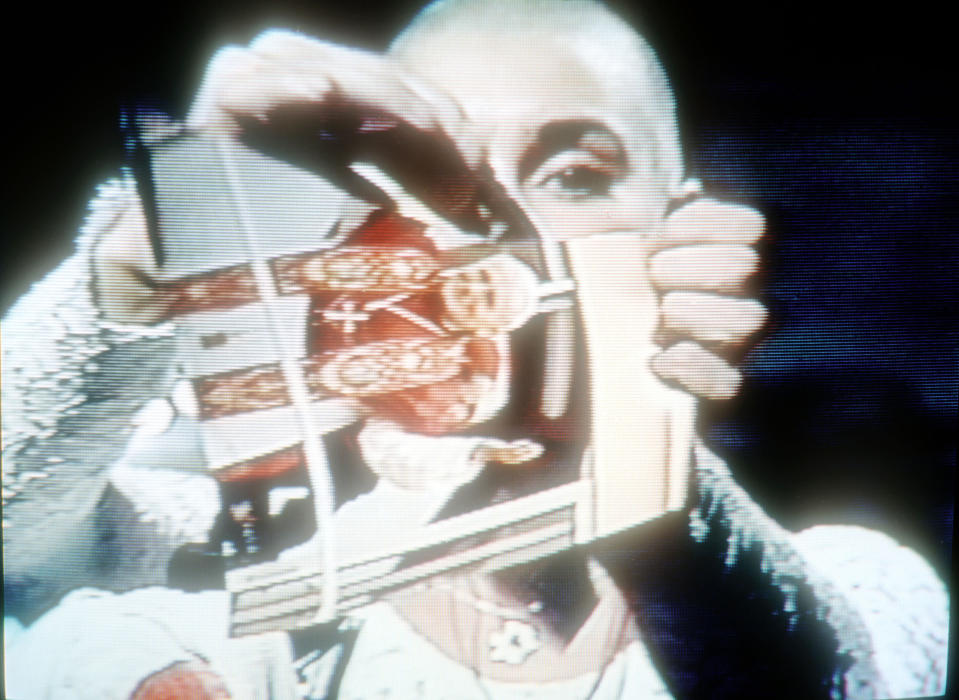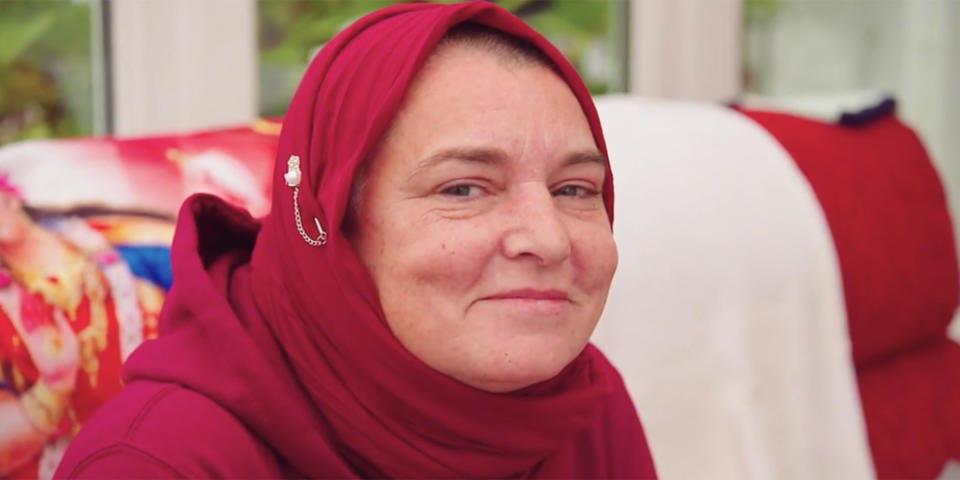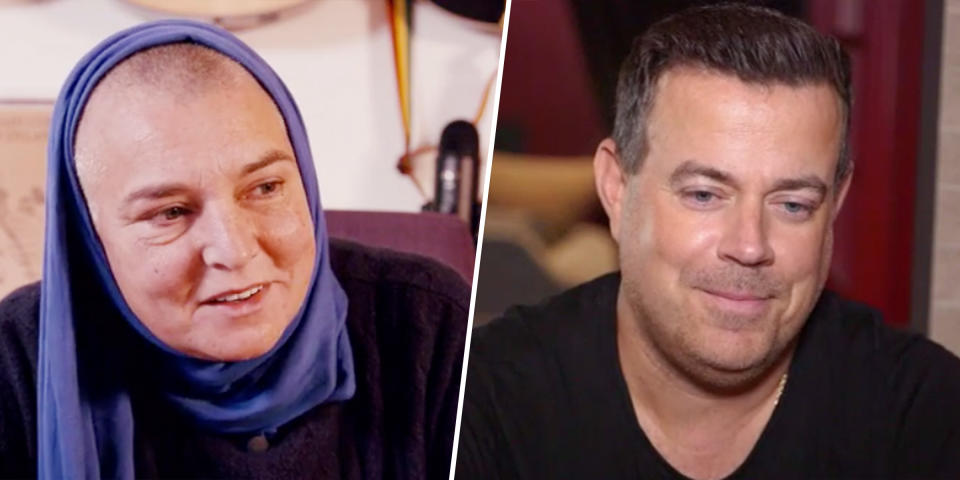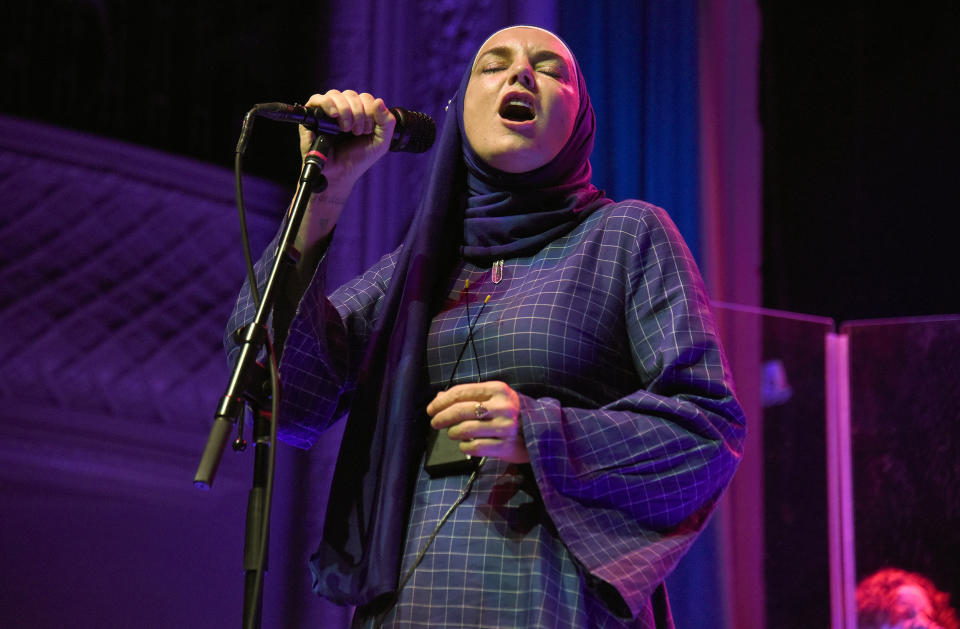Sinéad O’Connor explains how her shocking 'SNL' performance was 'a blessing'

Sinéad O’Connor, who infamously became a polarizing figure when she tore up a photo of Pope John Paul II during a 1992 appearance on “Saturday Night Live,” says she was making a statement against child abuse and allegations that would rock the Roman Catholic Church nearly 10 years later.
“Ten years after the pope ripping episode, you all then found out in America that this was going on,” O’Connor told Carson Daly in an interview that aired Tuesday on TODAY. “We always say Americans, they think nothing happened until they found out about it.”
Decades later, the moment continues to endure and while many believe her actions ruined her career, she says it highlighted something about her.

“‘Sinéad O’Connor’ was never meant to be a pop star,” she said. “I was really a protest singer, you know?”
She said tearing up the pope’s picture was a key moment for her.
“It was a blessing because I had to make my living doing the thing I loved doing, which is making music live,” she said.
The photo she tore belonged to her own mother, who had abused her.
“It was a way of ripping her up, as well, I guess,” she said.

Watch TODAY All Day! Get the best news, information and inspiration from TODAY, all day long.
Sign up for the TODAY Newsletter!
O’Connor, 54, has written a new memoir, “Rememberings,” in which she gets candid about the abuse and mental health challenges she experienced over the years.
“I suffer from a condition called complex post-traumatic stress disorder, from things that I went through growing up,” she said.
In a lengthy interview with the New York Times published last week, the Irish singer, who emerged on the late 1980s alternative rock scene with a shaved head and a punk attitude, reflected on the negative way the media wrote about her throughout the 1990s.

After scoring a No. 1 hit song in 1990 with her cover of Prince's "Nothing Compares 2 U," O'Connor found herself feeling out of place on the mainstream pop charts. She made headlines the following year when she announced she would boycott the Grammy Awards ceremony, citing the Recording Academy's penchant for awarding artists who score the most commercial success.
"The media was making me out to be crazy because I wasn’t acting like a pop star was supposed to act," she said. “It seems to me that being a pop star is almost like being in a type of prison. You have to be a good girl."
The vitriol reached a fever pitch after O'Connor tore up the photo of Pope John Paul II on "Saturday Night Live."
"I'm not sorry I did it. It was brilliant," O'Connor said. "But it was very traumatizing."

"It was open season on treating me like a crazy bitch," added the singer.
After the incident, O'Connor, who's long been candid about her struggles with mental illness, became the butt of comedians' jokes and was condemned by the Anti-Defamation League. She was criticized by countless public figures, including Madonna and Frank Sinatra.
"It was a very lonesome, lonesome 10 years," she said.
The Grammy winner — despite her boycott, O'Connor nabbed an award for Best Alternative Music Album in 1991 — was eventually diagnosed with complex post-traumatic stress disorder and borderline personality disorder.
One product of her trauma, she revealed, was blocking out much of the post-"SNL" period.
"I really trust the subconscious," said the singer. "If it doesn’t want you to remember something, there’s a very good reason for that."
O'Connor added that she later empathized with younger female pop stars — including Britney Spears — who were lambasted by the media for their own mental health struggles.
"What they did to Britney Spears was disgusting," she said. “If you met a stranger in the street crying, you’d put your arms around her. You wouldn’t start taking photos of her, you know?”
Nearly 30 years after her fateful "SNL" appearance, O'Connor has been vindicated in the eyes of many. In 2001, Pope John Paul II himself apologized for the sexual abuse of children by priests in the Catholic Church.
O'Connor never needed approval for her protest. She maintains that she — or anyone else — had the right to call out the abuse.
"Not because I was famous or anything, but because I was a human being, I had a right to put my hand up and say what I felt."
Related: